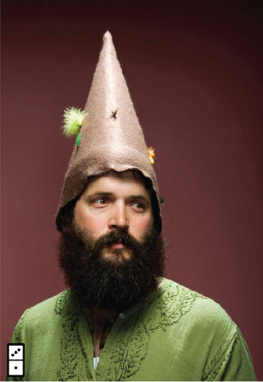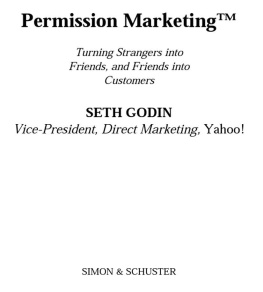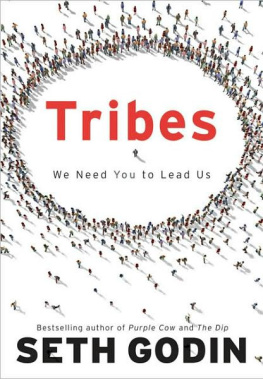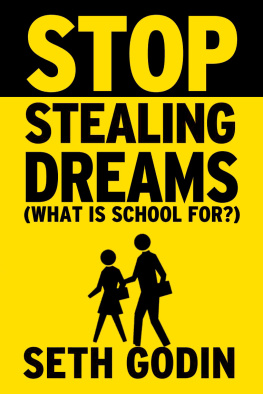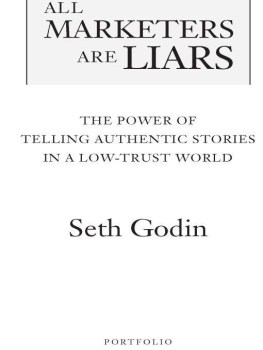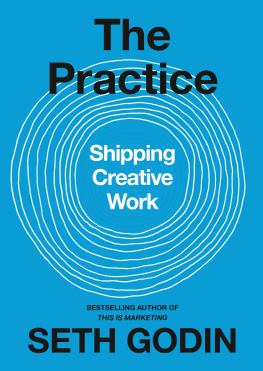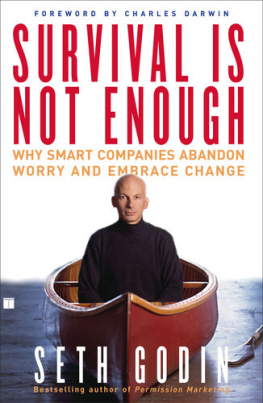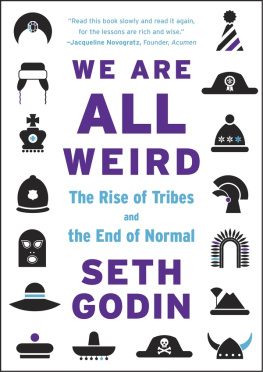WE ARE ALL WEIRD
Other books by Seth Godin
Poke the Box
Linchpin
Tribes
Meatball Sundae
All Marketers are Liars
The Dip
Free Prize Inside
Purple Cow
Survival is Not Enough
Unleashing the Ideavirus
Permission Marketing
Big Red Fez
The Big Moo (editor)
Small is the New Big
find them all at sethgodin.com
WE ARE ALL WEIRD
THE MYTH OF MASS AND THE END OF COMPLIANCE
BY SETH GODIN

2011 Do You Zoom, Inc.
The Domino Project
Published by Do You Zoom, Inc.
The Domino Project is powered by Amazon. Sign up for updates and free stuff at www.thedominoproject.com .
This is the first edition. If youd like to suggest a riff for a future edition, please visit our website.
Godin, Seth, 1960
We Are All Weird: The myth of mass and the end of compliance / Seth Godin
p. cm.
ISBN 978-1-936719-22-8
WE ARE ALL WEIRD
Contents
INTRODUCTION:
THE PREGNANT ELEPHANT
Ad legend Linda Kaplan Thaler tells the story of a zoo in Belgium, down on its luck. The crowds had stopped coming.
With the emergence of so many alternative amusements, diversions and novelties, the zoo had fallen on hard times. Attendance was down, but the animals still needed to get fed.
Then their elephant got pregnant.
Alert ad agency geniuses leapt into action. They put a sonogram of the baby elephant on YouTube. They ran polls and contests (girl or a boy?). Attention was paid. Hoopla was generated. The zoo was back on track, and attendance climbed.
The elephant gave the zoo its mass back. Mass reach, mass excitement, mass crowds. An apparent triumph for new media.
The story is told because it harks back to a happier time, to an era when ad agencies could easily do what they were paid to do: get the attention of the public. It reminds us that our economy is built on the back of mass, on public amusements, on factories organized to create widgets or services or entertainment for anyone (and everyone) with money to spend.
Marketers can be forgiven their nostalgia. Mass is no longer a scalable, predictable way to engage with the public. Success like the zoos is rare (because pregnant elephants are an oddity). From now on, mass market success will be the exception, the black swan.
Mass is dead. Here comes weird.
Mass, normal, weird & rich
This is a book about four words and how the revolution were living through demands we change our understanding of what they mean.
MASS is what allowed us to become efficient. Mass marketing and mass production and mass compliance to the rules of society have defined us. Mass is what we call the undifferentiated, the easily reached majority that seeks to conform and survive.
NORMAL is what we call people in the middle. Normal describes and catalogs the defining characteristics of the masses. Normal is localizedbeing a vegetarian is weird in Kansas but normal in Mumbai. Whats normal here is not whats normal there. Finding and amplifying normal is essential to anyone who traffics in mass. Over time, marketers have made normal a moral and cultural standard, not just a statistical one.
WEIRD are what we call people who arent normal. Your appearance or physical affect might be unusual by nature or by birth, but, like me, youre probably mostly weird by choice. Different by nature isnt your choice, and its not my focus here. Weird by choice, on the other hand, flies in the face of the culture of mass and the checklist of normal. Im interested in this sort of weird, people who have chosen to avoid conforming to the masses, at least in some parts of their lives.
RICH is my word for someone who can afford to make choices, who has enough resources to do more than merely survive. You dont need a private plane to be rich, but you do need enough time and food and health and access to be able to interact with the market for stuff and for ideas.
The swami I met in a small village in India is rich. Not because he has a fancy house or a car (he doesnt). Hes rich because he can make choices and he can make an impact on his tribe. Not just choices about what to buy, but choices about how to live.

Human beings prefer to organize in tribes, into groups of people who share a leader or a culture or a definition of normal. And the digital revolution has enabled and amplified these tribes, leaving us with millions of silos, groups of people who respect and admire and support choices that outsiders happily consider weird, but that those of us in the tribe realize are normal ( our normal).
My argument is that the choice to push all of us toward a universal normal merely to help sell more junk to the masses is both inefficient and wrong. The opportunity of our time is to support the weird, to sell to the weird and, if you wish, to become weird.
The battle of our time
Its not between men and women
or the left and the right
or even between the Yankees and the Red Sox.
The epic battle of our generation is between the status quo of mass and the never-ceasing tide of weird.
Its difficult to not pick sides. Either youll want to spend your time and effort betting on mass and the status quoand trying to earn your spot in this crowded mobor youll abandon that quest and realize that there are better opportunities and more growth if you market to and lead the weird.
Two decisions youll need to make within the hour:
1. Do you want to create for and market to and embrace the fast-increasing population that isnt normal? In other words, which side are you onfighting for the status quo or rooting for weird?and2. Are you confident enough to encourage people to do whats right and useful and joyful, as opposed to what the system has always told them they have to do? Should we make our own choices and let others make theirs?
PART 1: CAPITALISM, INDUSTRY AND THE POWER OF MASSAND ITS INEVITABLE DECLINE
Its not an accident that our instincts, expectations and biases are organized around honoring the masses. We shun the outliers, train students to conform and reward companies that create historically efficient mass market products.
The mass market redefines normal
The mass marketwhich made average products for average peoplewas invented by organizations that needed to keep their factories and systems running efficiently.
Stop for a second and think about the backwards nature of that sentence.
The factory came first. It led to the mass market. Not the other way around.
Governments went first, because its easier to dominate and to maintain order if you can legislate and control conformity. Marketers, though, took this concept and ran with it.
The typical institution (an insurance company, a record label, a bed factory) just couldnt afford mass customization, couldnt afford to make a different product for every user. The mindset was: This is the Eagles next record. We need to make it a record that the masses will buy, because otherwise it wont be a hit and the masses will buy something else.
This assumption seems obviousso obvious that you probably never realized that it is built into everything we do. The mass market is efficient and profitable, and we live in it. It determines not just what we buy, but what we want, how we measure others, how we vote, how we have kids, and how we go to war. Its all built on this idea that everyone is the same, at least when it comes to marketing (and marketing is everywhere, isnt it?).
Marketers concluded that the more the market conformed to the tight definition of mass, the more money they would make. Why bother making products for left-handed people if you can figure out how to get left-handed people to buy what youre already making? Why offer respectful choice when you can make more money from forced compliance and social pressure?
Next page
